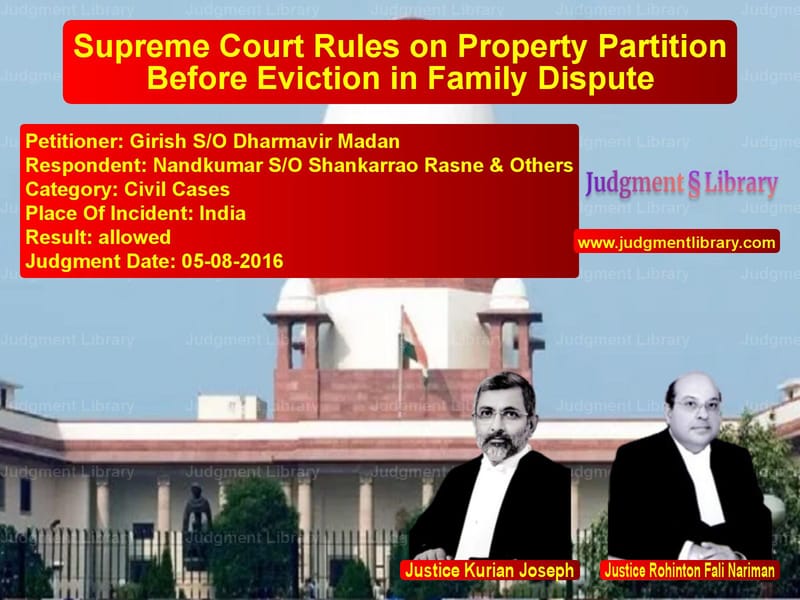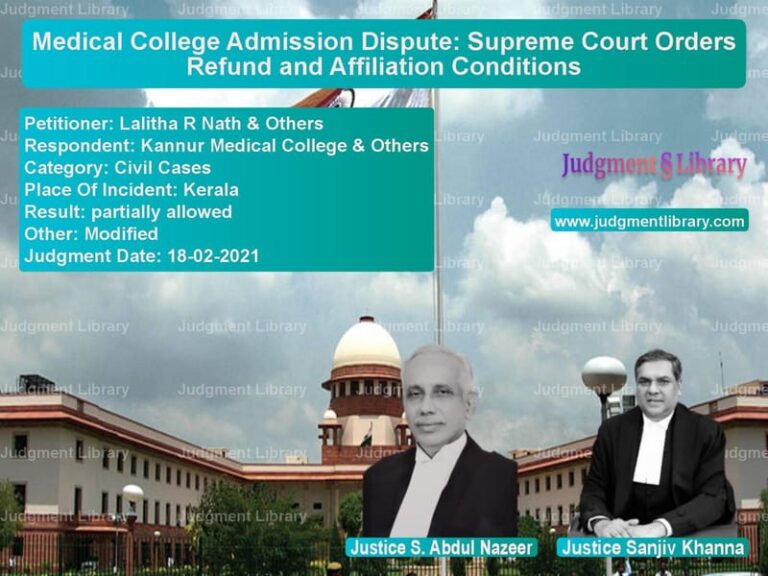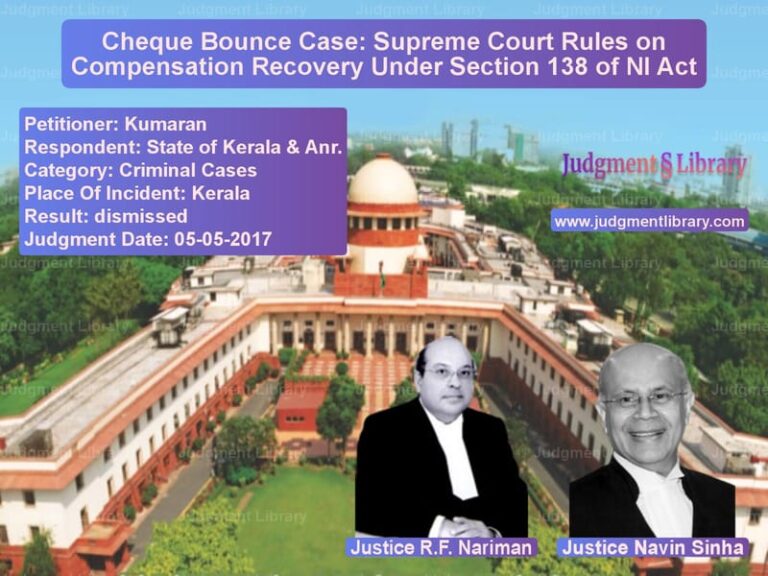Supreme Court Rules on Property Partition Before Eviction in Family Dispute
The case of Girish S/O Dharmavir Madan v. Nandkumar S/O Shankarrao Rasne & Others revolved around a property partition dispute that affected eviction proceedings. The Supreme Court, in its judgment dated August 5, 2016, ruled that eviction proceedings should be halted until the appellant’s share in the property was properly identified through a final decree.
Background of the Case
The dispute concerned a property jointly owned by multiple family members. A preliminary decree had been passed on December 6, 2004, recognizing the appellant’s 3/7th share in the property. However, eviction proceedings were initiated by the first respondent without first identifying and separating the appellant’s share.
The appellant, Girish, challenged the eviction proceedings, arguing that he could not be evicted without a final decree clarifying which portion of the property belonged to him. He sought relief from the Supreme Court, requesting that the identification process be completed before any eviction could be carried out.
Legal Issues
- Whether eviction proceedings can proceed without first identifying the appellant’s share in the property.
- Whether the trial court must appoint a Court Commissioner to determine the exact division of the property before enforcing eviction.
- Whether the ongoing second appeal (Second Appeal No. 611 of 2010) had any impact on the eviction case.
Petitioner’s Arguments (Girish S/O Dharmavir Madan)
The appellant contended:
- The preliminary decree had already recognized his 3/7th share, but the exact boundaries of his portion had not been identified.
- Without identifying his share, eviction proceedings would be unfair and unlawful.
- The trial court was obligated to appoint a Court Commissioner to carry out the partition process before eviction could take place.
- The ongoing second appeal should not influence the partition and eviction process.
Respondent’s Arguments (Nandkumar S/O Shankarrao Rasne & Others)
The respondents countered:
- The preliminary decree confirmed partition, and the appellant had no valid reason to delay eviction.
- Eviction proceedings were independent of the partition process and should continue.
- The appellant was using the lack of a final decree as a tactic to delay eviction.
- The special leave petition did not affect the eviction order.
Supreme Court’s Observations and Ruling
1. Eviction Proceedings Must Wait Until Partition Is Finalized
The Court ruled that eviction could not be carried out until the appellant’s share was properly identified:
“The eviction proceedings at the instance of the first respondent may not be proceeded with until the appellant’s 3/7th share of the property is identified as per the preliminary decree.”
The Court emphasized that eviction without proper identification of property shares would be unjust.
2. Trial Court Must Appoint a Court Commissioner
The Court directed the trial court to expedite the final decree process:
“The trial court shall take steps to appoint the Court Commissioner in the final decree proceedings so as to identify the respective shares.”
The Court set a deadline of two months from the date of production of the judgment for completing this process.
3. Special Leave Petition Has No Impact on Eviction Case
The Supreme Court clarified that the pending special leave petition in Second Appeal No. 611 of 2010 would not affect the eviction proceedings:
“The special leave petition filed against the Judgment in Second Appeal No. 611 of 2010 shall have no bearing on the eviction proceedings.”
Thus, the trial court could proceed with partition and eviction independently.
Final Verdict
The Supreme Court ruled:
- The eviction proceedings were put on hold until the appellant’s share was identified.
- The trial court was directed to appoint a Court Commissioner to complete the partition process within two months.
- The special leave petition had no impact on the case.
- No costs were awarded to either party.
Key Takeaways
- Eviction proceedings must wait until the disputed property shares are identified through a final decree.
- The trial court has a duty to appoint a Court Commissioner to carry out the partition.
- Legal disputes over property partition should be resolved before eviction orders are enforced.
- A pending special leave petition does not necessarily delay eviction proceedings.
Impact of the Judgment
The ruling has important implications for property disputes:
- It reinforces the principle that partition disputes must be settled before eviction.
- It ensures that property owners’ rights are protected in joint ownership cases.
- It provides a clear timeline for completing partition before enforcing eviction.
In conclusion, the Supreme Court’s decision in Girish S/O Dharmavir Madan v. Nandkumar S/O Shankarrao Rasne ensures that eviction does not take place until rightful ownership shares are determined, thereby protecting property rights.
Don’t miss out on the full details! Download the complete judgment in PDF format below and gain valuable insights instantly!
Download Judgment: Girish SO Dharmavir vs Nandkumar SO Shanka Supreme Court of India Judgment Dated 05-08-2016-1741878483859.pdf
Direct Downlaod Judgment: Direct downlaod this Judgment
See all petitions in Property Disputes
See all petitions in Landlord-Tenant Disputes
See all petitions in Judgment by Kurian Joseph
See all petitions in Judgment by Rohinton Fali Nariman
See all petitions in allowed
See all petitions in supreme court of India judgments August 2016
See all petitions in 2016 judgments
See all posts in Civil Cases Category
See all allowed petitions in Civil Cases Category
See all Dismissed petitions in Civil Cases Category
See all partially allowed petitions in Civil Cases Category







